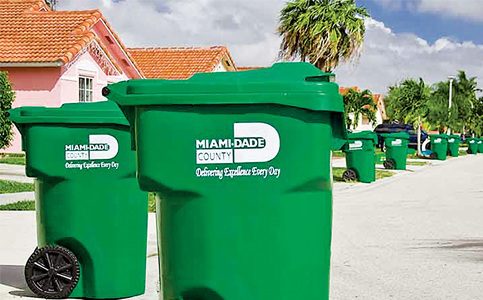Mayor makes case for continuing Miami-Dade recycling
By Richard Battin
On August 22, 2023

In a report to county commissioners last week, Mayor Daniella Levine Cava noted that a mid-July commission discussion centered on a concern that “recycling is much more expensive than simply taking the same waste to a landfill.” She sought to explain why she thinks recycling must continue.
The July discussion revolved around the pressure to raise recycling rates and whether that could be alleviated by canceling the county’s three recycling contracts.
It was mentioned, erroneously, that Broward County already had halted its recycling programs, although some Broward County cities have stopped their programs.
Mayor Levine Cava’s memo pointed out that state law “requires local governments to have recycling programs.
“And it is a key part of our strategy,” the mayor’s memo continued, “of reducing our dependency on landfills, and moving towards zero waste, where we repurpose and recycle materials back into our economy.
“In fact, the state law sets recycling goals for local governments. The state recycling goal was 75% by 2020,” the memo said. The county does not meet those three-year-old goals.
Piling on, the mayor pointed out that the fire last February that closed the Doral waste recovery facility put the county further behind. The facility produced 77 megawatts of electricity, 24 hours a day, seven days a week. “Renewable energy created from solid waste counted toward our recycling goal,” the mayor reported.
In a Catch-22 scenario, the mayor added that discussions with solid waste officials in Palm Beach County indicate ”the existence of an active recycling program is an important factor that federal and state regulators take into consideration when determining whether to issue permits for a waste-to-energy facility.”
Mayor Levine Cava asserted that “Palm Beach maintains a robust recycling program even though the costs exceed the revenues.
“The Administration recommends that the county continue to maintain a robust recycling program,” she wrote.
Toward that end, a county-initiated study last May, the mayor said, “shows its residential recyclable material stream to be less contaminated than in 2020.
“Results in 2023 indicate a nearly nine percentage point drop in the proportion of materials collected for recycling that are considered contamination.
The study’s results indicate a measured contamination rate of 39.9%, compared to 49% in 2020 at the height of the covid pandemic.”
Of the contamination categories measured, the “non-contracted material” category had the largest decrease. “This category includes materials that are not accepted for recycling – food waste, bagged material, expanded polystyrene, etc. – and materials that are accepted for recycling, but have been contaminated,” the memo explained.
“As part of the announced Zero Waste initiative,” the mayor said, “we will continue to look at ways to improve how we recycle.”
The decline in recycling contamination, the mayor said, allows the county to re-negotiate the processing rates as the contamination rate improves.
Proposals for the currently advertised recycling plans will be released after Sept. 6, she said. The new contamination rate “will hopefully reduce the net cost of our recycling program.”
The county works to educate residents on the proper way to recycle via various outreach initiatives – including mailings to homes, community events and school engagements, website information, advertisements on transit, radio, television, social media, and tagging of carts, Mayor Levine Cava said, and spends “roughly $250,000 per year on education and outreach.”
Miami-Dade, she said, “will continue working to improve contamination rates and increase participation in recycling in order to divert more waste from landfills and improve the county’s disposal capacity over time.”
This piece was republished from the Miami Today News.